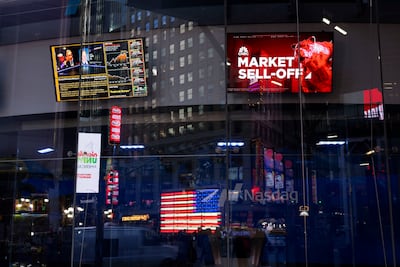If anything can be said to define the sharp fall in US and Asian stock markets seen this week, it is unpredictability. The past month’s flurry of trade tariffs and talk of recession in the US has upended many certainties in international trade. As a result, the S&P 500 sank to a six-month low, the Dow Jones Industrial Average fell about 1.1 per cent and the Nasdaq fell more than 3 per cent, with stocks in the so-called Magnificent Seven tech companies leading the plunge.
Even more uncertainty lies ahead this week, as three new insights into the health of the world’s biggest economy are expected. February’s US Consumer Price Index is being released today, tomorrow the Producer Price Index will follow and on Friday will see the publication of the Consumer Sentiment Index, a widely followed annual report from the University of Michigan. How markets will react to their findings is anyone’s guess.
Amid so much turbulence, short-term decision making and politicised trade policies, it is worth reflecting on the wisdom of thorough and long-term economic planning. Such strategic thinking was on display in the UAE this week as the Cabinet approved plans for the country's investment strategy. This aims to increase foreign investment to Dh240 billion ($65.35 billion) by 2031 and increase the Emirates' investment stock to Dh2.2 trillion over the coming years.

A closer look at the plan reveals a country playing to its strengths. Among the key sectors in focus are logistics, renewable energy and IT. Given the UAE's prime location, robust air and maritime links, solid tech partnerships such as that between Microsoft and Abu Dhabi’s G42, and embrace of green energy and the AI revolution, it is clear that its economic strategy is about innovation, not experimentation.
Neither is this 2031 investment strategy one of a kind – it sits amid a framework of other medium and long-term strategies the country has developed over the years, such as the Emirates’ target of being net zero by 2050, the Abu Dhabi Economic Vision 2030 and Operation 300 billion, which aims to develop the country’s manufacturing and industrial base. This not only about profitability and prosperity – this is about future-proofing the country for the sudden shocks or structural changes that can rattle the global economy.
Part of maintaining such economic resilience is to build diversified, meaningful trade links with other markets, particularly those in the Global South. It is notable therefore that Sheikh Mohammed bin Rashid, Prime Minister and Ruler of Dubai, told this week’s Cabinet meeting in Abu Dhabi that a review of the UAE’s strategic partnerships with African nations showed that 95 per cent of previously approved initiatives had been successfully implemented. This meant that the UAE’s trade volume with Sub-Saharan Africa has grown to Dh235 billion in five years – an 87 per cent increase.
Overall, the UAE’s latest investment plan paints a picture of a country that has already taken stock of a rapidly changing global economic picture and has acted accordingly. This is a policy framework that may prove capable of outliving the uncertainty that is roiling stock markets right now and threatens to do so in the months and years ahead.
Read next: UAE Cabinet approves National Investment Strategy 2031




